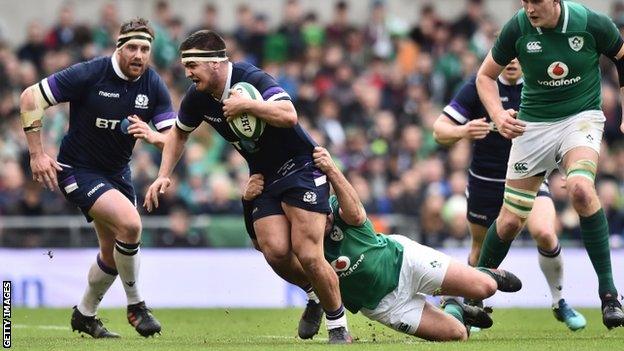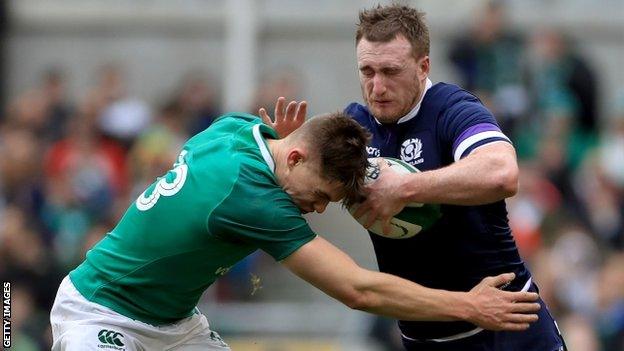Six Nations: Scotland get Dublin lesson on journey from also-rans to contenders
- Published
- comments
Six Nations 2018: Ireland 28-8 Scotland highlights
Stuart McInally left the field after an hour of Scotland's defeat in Dublin. When his number was up he walked slowly to the sideline, walked even more slowly up the touchline and then gingerly lowered himself into a chair with all the energy of a guy who knew he needed to sit down before he fell down.
Such was the gargantuan effort he'd put in, the hooker would have been forgiven had he nodded off on the spot. Eighteen tackles in 60 minutes is quite a number, but McInally was hardly the only contender in the most exhausted man competition.
Jonny Gray made 23 tackles in his 71 minutes, John Barclay made 25 tackles. Quite how Barclay found the lung capacity for a press conference later on was a mystery. He didn't need a microphone, he needed an oxygen mask.
Joe Schmidt's ruthless Irish machine won the day and deservedly so. His creation is relentlessly physical, supremely well-organised and virtually unstoppable in its own backyard. Schmidt is already a hero in Ireland. If, next weekend at Twickenham against beleaguered England, he manages to win just the third Grand Slam in the country's history, then rules are going to have to be broken about sainthoods only being doled out to the dead rather than the living.
Scotland? You cringed for them. They created more opportunities to score than they probably imagined in their dreams and wasted more than they could possibly have feared in their nightmares. They are a team that is growing up in an unforgiving world. They battle and entertain but they haven't yet reached the point where they can battle and entertain in victory on the road. That journey is a long one. Scotland have a way to travel, but hope remains.

Stuart McInally got though another tireless shift for Scotland before being replaced on the hour
Tiredness comes in two forms - physical and mental. Having to cope with the power of an Irish pack coming at you remorselessly for much of the day is always going to sap the body. Having to live with your own critical lack of composure in key moments is guaranteed to weaken the mind.
During the week, Barclay went through a vast list of things that Scotland had to get right if they were to win in Dublin. Ten minutes after starting his answer he was still going. One of his key points was that Ireland are not normally in the business of giving teams too many chances to score at the Aviva and that the ones Scotland did manage to create had better be taken or else defeat was certain.
At some point in the next day or so, these Scottish players are going to have to sit in front of a computer and analyse what went on in Dublin. It won't be pleasant. Peter Horne's intercepted pass? Seven points for Ireland right there. Huw Jones' butchered pass to Stuart Hogg on the half-hour? Seven points that Ireland should have conceded, but didn't.
Match stats - Ireland v Scotland | ||
|---|---|---|
Ireland | Scotland | |
62% | Possession | 38% |
63% | Territory | 37% |
601 | Metres made | 415 |
35 | Kicks from hand | 25 |
8 | Line breaks | 4 |
4 | Offloads | 13 |
135 (17) | Tackles made (missed) | 190 (22) |
5 | Turnovers won | 4 |
9 | Penalties | 10 |
12 (2) | Line-outs won (lost) | 10 (4) |
11 (1) | Scrums won (lost) | 4 (0) |
It wasn't just seven points lost, though. It was a gift to Ireland. Had Jones executed that schoolboy pass then Hogg was away and under the posts. The Irish players had dominated the match up to that point and a converted Scotland try, off their first notable attack, would have put the visitors ahead 10-7. That's a seed of doubt planted in the ground under the feet of the Irish players. That's a silencing of the Aviva crowd.
Ireland got away with one and these things matter. These psychological moments are huge. Then, another. The overthrown Scottish line-out in the last seconds of the first half? Another seven for Ireland. Horne needlessly playing the ball off his feet early in the second half? Another seven came soon after.
At 21-3 the game is over, but the barrel of the gun that Scotland used to shoot themselves in the foot had many bullets. With the try-line beckoning, Hogg over-fired a pass to Blair Kinghorn on a free play. Scotland actually made amends by scoring in the next play, but there was another self-inflicted wound on its way.

Scotland full-back Stuart Hogg carried the ball 16 times and made 120m, but couldn't add to his try tally
Horne, with Jones and Kinghorn running free outside him, found neither of them. Another five, or possibly, seven points cast to the wind. Horne looked to the heavens in the aftermath. There was no forgiveness up there. No comfort, no relief.
What ails this team on the road? What makes them such a clinical force at home and so wasteful away from home? A lack of nous, a lack of belief against the big guns in their own place, a naivety?
It would be entirely wrong to bracket this defeat with what happened in Wales. The world's most powerful microscope couldn't have found a positive from the Principality, but there was a progression here, there was a game-plan constructed that would have got them a whole lot closer than 20 points had Scotland had not repeatedly jammed the self-destruct button on the final pass.
While Ireland head to Twickenham in search of a Grand Slam, Scotland head for Rome still in the hunt for third. After the debacle against Wales, this team learned some lessons and took out France and England. Against Ireland they got another education in what life is like at the top end of the Six Nations and they'll learn from that, too. Nobody said this was going to be easy. Transforming yourself from also-rans into contenders is a savagely difficult business.
Not so long ago, Ireland were on the same road as Scotland are on now. From the heady heights of a third championship in five years, they wrote the book on how pain can lead to gain.